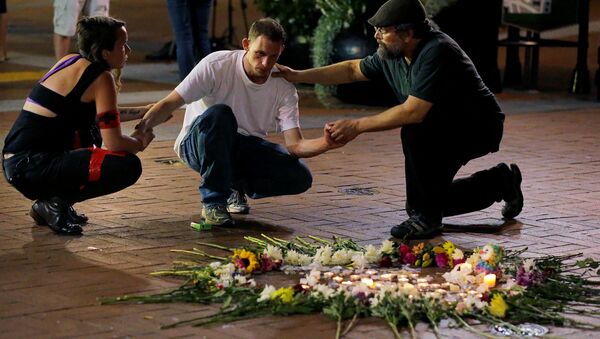While attacks from groups like Daesh are becoming less frequent, terrorism from the far-right is becoming more and more common. The number of deaths worldwide due to terrorism by far-right groups and individuals increased from three in 2014 to 17 in 2017, the report notes.
"Far-right groups and individuals accounted for nearly 60 percent of extremist-related American deaths in 2017," the report says. Globally, "there were 66 deaths from terrorism caused by far-right groups and individuals from 113 attacks for the years from 2013 to 2017. Of those, 17 deaths and 59 attacks occurred in 2017 alone."
In 2017, "white power extremists" were behind nine attacks in North America, which saw a total of seven deaths.
— Alex Rubinstein (@RealAlexRubi) December 5, 2018
The worldwide decline in terrorism and terror-related deaths was significant: a 27 percent decrease in one year. That's 18,814 deaths compared to 25,774 in 2016. The figure has "now fallen 44 percent from its peak in 2014," said the report, which was produced by the nonpartisan think tank Institute for Economics & Peace.
The report looked at 163 countries and found that 96 of them saw fewer deaths from terrorism during 2017 than in 2016, while 46 saw more.
The number of attacks taking place in the countries studied also decreased 23 percent between 2016 and 2017
In 2017, there was at least one death from terrorism in 67 countries, which was 12 fewer than the previous year, which broke the record. However, 2017 saw the second highest number of countries that have experienced a fatality from terrorism since 2002.
"Al-Shabaab committed the deadliest attack of 2017, which killed 587 people. In Egypt, the Islamic State [Daesh] Sinai Province carried out the second deadliest attack, which killed 311 people," the report says.
Nonetheless, deaths attributed to Daesh dropped by a whopping 52 percent, as the group continues to see its influence dwindle in Iraq and Syria.
"The lethality of terrorist attacks has declined as the operational capacity of groups like ISIL [Daesh] has fallen over the past three years," it says. "Twenty percent of terrorist attacks were unsuccessful in 2017, compared to just over 12 percent in 2014."
The report says that more than 99 percent of deaths from terrorism happen in countries experiencing a violent conflict or with "high levels of political terror." Attacks tend to be "more lethal on average" in such places, with 2.4 people typically killed per attack in "conflict-affected countries," while the rate is just 0.84 people per attack in countries without conflict.
"Egypt and Somalia had the largest increases in deaths from terrorism, with deaths increasing by 123 percent and 93 percent respectively," the report says.
The report notes that "Islamic terrorist organizations" are remarkably fluid, as they break up and form new groups and coalitions at a lightning pace. "Of the 169 terrorist groups responsible for at least one death in 2017, 42 were new groups that had not caused any deaths in previous years," the report says.
However, the Islamic State of Iraq and the Levant [Daesh], the Taliban, al-Shabaab and Boko Haram were "responsible for 10,632 deaths from terrorism, representing 56.5 percent of total [terrorism] deaths in 2017," the report says. They were also behind "44 percent of the [terrorism] deaths" in the past decade.
"In 2012, just prior to the large increase in terrorist activity around the world, these four groups were responsible for 32 percent of all deaths from terrorism. A decade ago, they accounted for just 6 percent," the report says.



